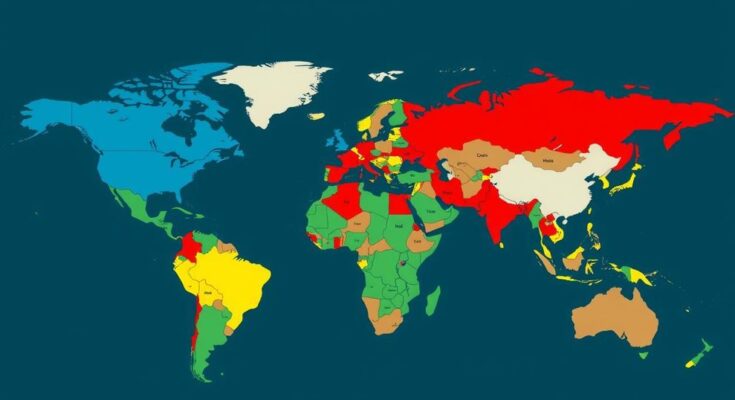Developing nations, particularly Malawi, are beginning to receive financial compensation for climate change-related damages, exemplified by the case of Christopher Bingala, a subsistence farmer affected by Cyclone Freddy. A new loss and damage fund, with over $720 million pledged by wealthier nations, aims to provide much-needed support to countries disproportionately affected by climate disasters. However, experts warn that this funding is insufficient given the increasing severity of such events globally.
The onset of Cyclone Freddy in 2023 marked a devastating chapter for many in southern Malawi, including Christopher Bingala, who experienced floodwaters inundating his home in the wee hours of the morning. This unprecedented storm, recognized as the longest-lasting tropical cyclone on record, resulted in substantial losses for Bingala, a subsistence farmer who was able to evacuate his six children but unfortunately lost his home and livestock. Fortunately, he received approximately $750 through a newly established funding mechanism aimed at compensating victims of climate change-induced disasters.
This payment represents one of the first instances of “loss and damage” compensation, following the acknowledgment that low-income countries disproportionately suffer from climate change impacts despite having minimal contributions to global pollution. In response to this, wealthier nations last year pledged the creation of a specialized fund to address these damages. Currently, about $720 million has been promised from various countries, including the European Union, the United States, and the United Arab Emirates, although experts caution that this amount is insufficient to meet the growing needs resulting from escalating climate events.
At the ongoing COP29 climate summit in Baku, Azerbaijan, negotiations are focused on the financial obligations owed by developed nations to the disadvantaged, as part of a broader climate finance package incorporating loans and investments. “We just hope that the global north and the nations whose economy is fueled by the emissions – they come to the plate and take up their responsibility to look at what they’re causing us,” said Prime Minister Philip Davis of the Commonwealth of the Bahamas, emphasizing the urgency for accountability from wealthier nations.
Bingala’s story is not unique; it reflects the severe consequences Cyclone Freddy inflicted, displacing approximately 650,000 people in Malawi alone with the storm dumping six months’ worth of rain in merely six days. Forced to relocate to temporary shelters, families faced dire shortages of food, prompting desperate measures, as Bingala revealed, “We got to a point where we would eat meat from animals that had died from the cyclone because we lacked food.” However, following the receipt of the cash payment, Bingala was able to build a new home and relocate to a less vulnerable area, improving conditions for his family despite ongoing challenges.
The funding received by Bingala originated from the Scottish government, the first to commit resources specifically for loss and damage relief. In Malawi, these funds were administered by GiveDirectly, a non-profit that specializes in cash grants. Roughly 2,700 families benefitted from payments enabling them to rebuild their lives, illustrating the potential benefits of such funding measures. “Low-income households in low-income countries have far less protections from extreme events,” noted Yolande Wright, vice president of partnerships at GiveDirectly.
The loss and damage funding initiative represents a pilot program aimed at establishing a comprehensive system for compensation, emerging from global recognition of the undue burden faced by low-income countries contributing negligibly to climate change. Many nations have expressed the need for broader utilization of the fund, not limited to disaster recovery but also targeting essential relocations and compensation for lost cultural and ecological resources, as climate devastation becomes increasingly common and severe.
Given the alarming trend of intensifying natural disasters, the expectations for loss and damage funding are projected to reach an estimated $250 billion annually by 2030. As Prime Minister Davis pointed out, the consequences of inaction on climate change could yield global repercussions, underscoring the imperative for wealthier nations to step forward, “When my islands are swallowed up by the sea, then what do my people do?” This urgent appeal highlights an emerging reality where humanitarian crises do not respect borders, reiterating the importance of collective action and responsibility in mitigating climate change impacts.
The rising rhetoric surrounding climate change has led to a disproportionate impact on low-income countries, which often suffer from severe weather events despite minimal contributions to greenhouse gas emissions. The establishment of loss and damage funding represents a critical step in addressing the needs of these vulnerable populations, as they face increasing challenges due to climate adaptation while requiring financial assistance to recover from disasters. The recent initiatives initiated at global climate summits underscore the urgency and necessity of international cooperation to assist those most affected by climate change.
In summary, the emergence of loss and damage compensation signifies an important shift in acknowledging the financial obligations of wealthier nations to support poorer countries most affected by climate crises. The stories of individuals like Christopher Bingala exemplify the profound challenges faced by families in the wake of extreme weather events. Although initial pledges for funding have been made, the escalating need for comprehensive support remains a pressing issue on the global agenda, necessitating a robust response from the international community.
Original Source: www.wuwm.com




